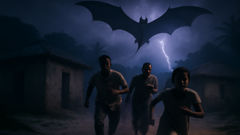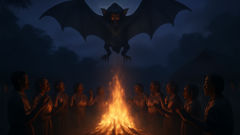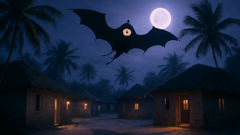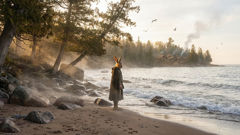Introduction
Night descends gently over Zanzibar, cloaking the ancient alleys of Stone Town and the hushed palm groves that fringe the sea. Breezes thick with clove and brine drift between weathered coral walls, carrying laughter from distant markets and the soft thud of fisherman’s oars. Yet beneath the rhythmic pulse of island life, a current of unease winds through the hearts of its people. They murmur of Popobawa—a name whispered in fear, never spoken aloud after dusk. In the humid dark, every creak and flutter becomes a warning. Stories pass from grandparent to grandchild, tales of a shape-shifting shetani with one gleaming eye and leathery wings that blot out the moon. Men sleep lightly, doors are barred, and the rustle of banana leaves against a rooftop can make even the bravest shudder. Popobawa is more than a myth in Zanzibar; it is a shadow that slips through keyholes, a terror that haunts the islands from Pemba to the Tanzanian mainland. The legend is rooted in centuries of belief, born from the mingling of Swahili, Arab, and African spirits—a testament to the way fear lingers in places where the veil between worlds grows thin. This is a tale of ordinary villagers grappling with extraordinary evil, of courage found in the flicker of a lantern and the embrace of community. In the following pages, the legend of the Popobawa unfolds not just as a chilling ghost story, but as a mirror reflecting the struggles, hopes, and resilience of those who call Zanzibar home.
A Night of Dread
It began on a night when the air was thick with the promise of rain, the scent of earth rising from the coral stone lanes of Stone Town. The village of Kizimkazi, nestled between the dense forest and restless sea, was alive with anticipation for the season’s first downpour. Children chased each other around baobab trees, their shrill laughter echoing through the dusk. In every home, mothers prepared ugali and spiced coconut stew, and fathers repaired fishing nets by the light of hurricane lamps. Yet beneath these simple routines, an old fear stirred, as palpable as the coming storm.

Salim bin Rashid was the village’s night watchman—a job handed down from his grandfather, who spoke of spirits that once roamed the mangrove swamps. Tall and wiry, Salim moved with quiet confidence, his senses attuned to every shift in wind or animal call. He didn’t believe in all the old stories. Or so he liked to say. But even he hesitated as he stepped onto the sandy path that snaked between clustered huts, lantern in hand. Tonight, his wife, Asha, had pleaded with him to stay indoors. “It is Popobawa’s time,” she whispered, her voice trembling. “He comes with the dark clouds. Do not tempt fate.”
Salim forced a laugh, but her words gnawed at him. The Popobawa, he knew, was more than a tale to frighten children. Men from neighboring villages claimed they had seen it—felt its presence in the dead of night. A shetani with a single glaring eye, bat’s wings wide as a dhow’s sail, and claws that left no wound but drained all courage from its victim. They said it assaulted men in their sleep, leaving shame and terror in its wake. Those who spoke of it too loudly often suffered its wrath. Superstition? Maybe. But in Zanzibar, where every shadow might hide something ancient, caution became a survival instinct.
His patrol took him past the home of Mama Fatuma, an old woman with eyes sharp as a falcon’s. She sat on her porch, rocking and humming old Swahili hymns, beads clicking in her fingers. “Salim,” she called, “the spirits are restless tonight. Remember your grandfather’s words.”
Salim nodded, offering her a small smile. The old stories had always seemed like echoes from another time. But as a low wind picked up, whistling through the palms, he felt a chill settle in his bones. Lantern light danced across the walls, casting flickering shapes that darted and twisted. The sky grew heavy with clouds, and the first fat drops of rain splattered on the sandy earth. As thunder rumbled offshore, Salim’s thoughts returned to the Popobawa.
Suddenly, a shriek split the night—a sound half-human, half-beast. Salim froze, heart thudding. Above the rooftops, something vast and black swept across the moon. For a moment, he saw it: wings like torn velvet, a hunched body, and one blazing, cyclopean eye. It moved faster than any bird, gliding soundlessly, its shadow swallowing the lantern’s glow. He ducked behind a stack of crates, holding his breath. The creature circled once, then vanished into the treetops.
The village erupted into chaos. Dogs barked frantically; children were pulled indoors. Doors slammed and prayers spilled from trembling lips. Salim stumbled home, every muscle taut with dread. Asha met him at the threshold, her face ashen. “Did you see it?” she whispered. He could only nod.
Throughout the long, electric night, no one slept. Men huddled together in silent fear, clutching charms and muttering supplications. Some blamed neighbors for inviting the spirit; others accused outsiders or jealous rivals. Fear bred suspicion as surely as it bred silence. In the quiet hours before dawn, Salim sat at his window, staring out into the rain, haunted by the memory of that burning eye.
When the sun finally rose, painting the sea in gold and copper, the village gathered at the mosque. The imam led prayers for protection, his voice steady but his eyes shadowed. The elders debated what should be done. Should they call a mganga—a traditional healer—to exorcise the evil? Should they sacrifice a goat to appease the restless spirits? Or should they flee, abandoning their ancestral land to the darkness? Opinions clashed, but all agreed: Popobawa had returned. It would not leave until it was acknowledged—and confronted.
For Salim, the terror of that night changed everything. He could no longer dismiss the legend as mere superstition. He saw the fear etched into every face, felt it twist in his own gut. As he watched his neighbors—once proud and strong—reduced to whispers and wary glances, he realized that the true power of Popobawa was not just in its monstrous form, but in the shadow it cast over human hearts.
The Gathering Storm
Days passed under a pall of unease. In Kizimkazi and nearby villages, the rhythm of daily life stumbled. The fish market grew quieter, the mosque less full. Children played only in the narrowest alleys, never venturing near the forest’s edge. Rumors spread like wildfire: Popobawa had visited not just Kizimkazi but also Nungwi and Matemwe. Some said it perched on rooftops, watching with its baleful eye; others claimed it slipped into homes as a whisper of wind, its presence marked by nightmares and unexplained bruises.

Salim became obsessed with finding answers. Guilt gnawed at him—he was the watchman, the protector, and yet he had failed to keep his neighbors safe. Each evening, he patrolled with his old lantern and a heavy stick, eyes darting to every fluttering shadow. Yet it was not until he visited Mama Fatuma again that he began to understand.
She greeted him with her usual calm, offering sweet, spiced tea. “Popobawa thrives on fear,” she told him quietly. “It is not just a creature—it is a spirit made strong by our terror and mistrust.” She traced patterns in the dust with her finger: spirals and circles, ancient Swahili symbols for protection and unity. “Long ago, when the spirits grew restless, people came together. They sang and prayed, they shared their fears openly. That is what weakens Popobawa—not hiding, not blaming.”
Her words echoed in Salim’s mind. He remembered tales from his grandfather—of times when villages joined in ritual dances, fires burning through the night to keep evil at bay. The shetani, his grandfather said, could not withstand the courage of a united people.
That night, Salim gathered the bravest villagers: fishermen scarred by storms, mothers whose lullabies were woven with old prayers, young men eager to prove themselves. They sat in a circle beneath the stars, a fire crackling in their midst. Salim spoke first, confessing his fear and shame. Others followed, voices trembling at first, then growing stronger. They recounted dreams of being hunted, feelings of helplessness, suspicions that festered like wounds.
As their secrets spilled into the night air, a change seemed to come over the group. The fire burned brighter; the shadows receded. Mama Fatuma led them in an old Swahili chant—a song of courage and protection. Drums joined in, their rhythm echoing through the palms. For the first time in days, laughter returned, small but stubborn.
But Popobawa was not easily banished. That very night, as the villagers tried to sleep, a terrible wailing rose from the forest. Salim jumped from his mat and rushed outside. Asha was at his side, clutching a bundle of protective charms. The villagers gathered again, eyes wide with terror. Above the treetops, the Popobawa appeared, its wings blotting out the stars. It swooped low over the fire circle, its single eye blazing with fury.
Yet this time, the people did not scatter. They stood shoulder to shoulder, chanting and drumming, faces set with determination. Salim raised his stick and shouted defiance at the creature. The Popobawa screamed, a sound that shook the very ground. It circled once, then twice, its form wavering in the firelight.
Suddenly, a gust of wind swept through the village, snuffing out torches and sending embers flying. The spirit plunged toward the circle—but as it drew near, it shuddered and recoiled, its wings battered by invisible forces. The villagers kept chanting, their voices rising above the wind. Mama Fatuma threw a handful of salt into the fire, and Asha waved her charms in the air. The creature howled, then dissolved into a cloud of smoke that vanished into the trees.
For hours afterward, no one dared to speak. When dawn finally broke, painting the sky in pink and silver, the village breathed a collective sigh of relief. Children emerged, blinking in the new light; mothers embraced; men clasped each other’s hands. It seemed—for now—that Popobawa had been driven away. But Salim knew better. The legend would never truly die; it lived on in every fearful glance, every story whispered after sunset.
Still, something had changed. The villagers had faced their terror together, and that unity became their shield. As life slowly returned to normal—boats setting out to sea, markets filling with song—Salim felt a quiet pride. They had met the darkness and survived. And in that survival was hope: that even the oldest evils could be kept at bay, if only people stood together.
Conclusion
The legend of Popobawa lingers long after the last embers die and the sun chases away Zanzibar’s shadows. In every village, from coral-stone alleyways to windswept beaches, its name is still spoken with caution—never too loud, never in jest. For those who lived through the terror, the memory remains: fear that pressed on their hearts like humid air, courage that rose when they stood as one. Popobawa’s power was never only in its monstrous form but in its ability to divide and isolate. The villagers’ greatest victory was not its banishment but their own refusal to surrender to suspicion and silence. In the end, every whispered tale and midnight chant becomes more than folklore—it is a reminder that evil endures when people turn against each other, but falters when they unite. Zanzibar endures too: resilient, vibrant, its people carrying both caution and hope into each new night. And so the story continues, carried on the wind—waiting, perhaps, for the next time shadows grow long and courage is called for once more.













